
List of Baroque architecture
Encyclopedia
The following is a list of examples of various types of Baroque architecture
since its origins.
Baroque architecture
Baroque architecture is a term used to describe the building style of the Baroque era, begun in late sixteenth century Italy, that took the Roman vocabulary of Renaissance architecture and used it in a new rhetorical and theatrical fashion, often to express the triumph of the Catholic Church and...
since its origins.
| Building | Picture | Location | Date | Architect(s) |
|---|---|---|---|---|
| St Peter's Basilica | 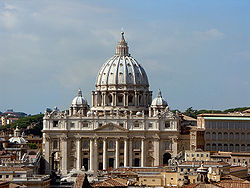 |
Vatican City Vatican City Vatican City , or Vatican City State, in Italian officially Stato della Città del Vaticano , which translates literally as State of the City of the Vatican, is a landlocked sovereign city-state whose territory consists of a walled enclave within the city of Rome, Italy. It has an area of... |
1506–1615 | Michelangelo Michelangelo Michelangelo di Lodovico Buonarroti Simoni , commonly known as Michelangelo, was an Italian Renaissance painter, sculptor, architect, poet, and engineer who exerted an unparalleled influence on the development of Western art... , Giacomo della Porta Giacomo della Porta Giacomo della Porta was an Italian architect and sculptor, who worked on many important buildings in Rome, including St. Peter's Basilica. He was born at Porlezza, Lombardy and died in Rome.-Biography:... , Carlo Maderno Carlo Maderno Carlo Maderno was a Swiss-Italian architect, born in Ticino, who is remembered as one of the fathers of Baroque architecture. His façades of Santa Susanna, St. Peter's Basilica and Sant'Andrea della Valle were of key importance in the evolution of the Italian Baroque... |
| Urbanistic complex of the city of Valletta | 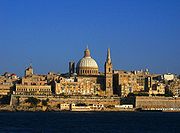 |
Valletta Valletta Valletta is the capital of Malta, colloquially known as Il-Belt in Maltese. It is located in the central-eastern portion of the island of Malta, and the historical city has a population of 6,098. The name "Valletta" is traditionally reserved for the historic walled citadel that serves as Malta's... , Malta |
1566–1798 | Francesco Laparelli, Gerolamo Cassar |
| Church of the Gesu Church of the Gesu The Church of the Gesù is the mother church of the Society of Jesus, a Roman Catholic religious order also known as the Jesuits. Officially named , its facade is "the first truly baroque façade", introducing the baroque style into architecture ,. The church served as model for innumerable Jesuit... |
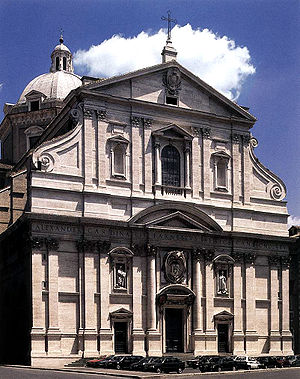 |
Rome Rome Rome is the capital of Italy and the country's largest and most populated city and comune, with over 2.7 million residents in . The city is located in the central-western portion of the Italian Peninsula, on the Tiber River within the Lazio region of Italy.Rome's history spans two and a half... , Italy |
1568–1580 | Giacomo Barozzi da Vignola Giacomo Barozzi da Vignola Giacomo Barozzi da Vignola was one of the great Italian architects of 16th century Mannerism. His two great masterpieces are the Villa Farnese at Caprarola and the Jesuits' Church of the Gesù in Rome... , Giacomo della Porta Giacomo della Porta Giacomo della Porta was an Italian architect and sculptor, who worked on many important buildings in Rome, including St. Peter's Basilica. He was born at Porlezza, Lombardy and died in Rome.-Biography:... |
| Santa Susanna Santa Susanna The Church of Saint Susanna at the baths of Diocletian is a Roman Catholic parish church on the Quirinal Hill in Rome, with a titulus associated to its site that dates back to about 280... |
_-_facade.jpg) |
Rome Rome Rome is the capital of Italy and the country's largest and most populated city and comune, with over 2.7 million residents in . The city is located in the central-western portion of the Italian Peninsula, on the Tiber River within the Lazio region of Italy.Rome's history spans two and a half... , Italy |
1585–1603 | Carlo Maderno Carlo Maderno Carlo Maderno was a Swiss-Italian architect, born in Ticino, who is remembered as one of the fathers of Baroque architecture. His façades of Santa Susanna, St. Peter's Basilica and Sant'Andrea della Valle were of key importance in the evolution of the Italian Baroque... |
| Wallenstein Palace Wallenstein Palace Wallenstein Palace is a Baroque palace in Malá Strana, Prague, currently the home of the Czech Senate.-History:The original Palace was built in years 1623-1630 by Albrecht von Wallenstein, Duke of Mecklenburg , who made his name and fortune as the Commander-in-Chief of the Imperial forces in the... |
Prague Prague Prague is the capital and largest city of the Czech Republic. Situated in the north-west of the country on the Vltava river, the city is home to about 1.3 million people, while its metropolitan area is estimated to have a population of over 2.3 million... , Czech Republic |
1623–1630 | Giovanni de Galliano Pieroni Giovanni de Galliano Pieroni Giovanni de Galliano Pieroni – military engineer specializing in erecting fortifications , architect, mathematician and astronomer.... , Andrea Spezza, Niccolo Sebregondi |
|
| Château de Versailles Palace of Versailles The Palace of Versailles , or simply Versailles, is a royal château in Versailles in the Île-de-France region of France. In French it is the Château de Versailles.... |
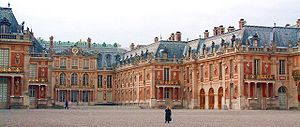 |
Versailles Versailles Versailles , a city renowned for its château, the Palace of Versailles, was the de facto capital of the kingdom of France for over a century, from 1682 to 1789. It is now a wealthy suburb of Paris and remains an important administrative and judicial centre... , France |
1661–1774 | Jules Hardouin Mansart Jules Hardouin Mansart Jules Hardouin-Mansart was a French architect whose work is generally considered to be the apex of French Baroque architecture, representing the power and grandeur of Louis XIV... , Louis Le Vau Louis Le Vau Louis Le Vau was a French Classical architect who worked for Louis XIV of France. He was born and died in Paris.He was responsible, with André Le Nôtre and Charles Le Brun, for the redesign of the château of Vaux-le-Vicomte. His later works included the Palace of Versailles and his collaboration... , André Le Nôtre André Le Nôtre André Le Nôtre was a French landscape architect and the principal gardener of King Louis XIV of France... (gardens) and many co-operators |
| San Carlo alle Quattro Fontane San Carlo alle Quattro Fontane The Church of Saint Charles at the Four Fountains is a Roman Catholic church in Rome, Italy. Designed by the architect Francesco Borromini, it was his first independent commission. It is an iconic masterpiece of Baroque architecture, built as part of a complex of monastic buildings on the Quirinal... |
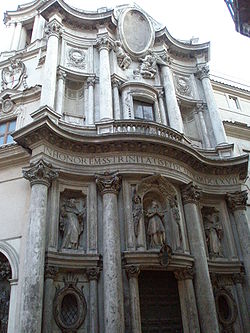 |
Rome Rome Rome is the capital of Italy and the country's largest and most populated city and comune, with over 2.7 million residents in . The city is located in the central-western portion of the Italian Peninsula, on the Tiber River within the Lazio region of Italy.Rome's history spans two and a half... , Italy |
1665–1676 | Francesco Borromini Francesco Borromini Francesco Borromini, byname of Francesco Castelli was an architect from Ticino who, with his contemporaries, Gian Lorenzo Bernini and Pietro da Cortona, was a leading figure in the emergence of Roman Baroque architecture.A keen student of the architecture of Michelangelo and the ruins of... |
| San Lorenzo (Turin) | Turin Turin Turin is a city and major business and cultural centre in northern Italy, capital of the Piedmont region, located mainly on the left bank of the Po River and surrounded by the Alpine arch. The population of the city proper is 909,193 while the population of the urban area is estimated by Eurostat... , Italy |
1666–1679 | Guarino Guarini | |
| St Paul's Cathedral St Paul's Cathedral St Paul's Cathedral, London, is a Church of England cathedral and seat of the Bishop of London. Its dedication to Paul the Apostle dates back to the original church on this site, founded in AD 604. St Paul's sits at the top of Ludgate Hill, the highest point in the City of London, and is the mother... |
London London London is the capital city of :England and the :United Kingdom, the largest metropolitan area in the United Kingdom, and the largest urban zone in the European Union by most measures. Located on the River Thames, London has been a major settlement for two millennia, its history going back to its... , England |
1675–1710 | Christopher Wren Christopher Wren Sir Christopher Wren FRS is one of the most highly acclaimed English architects in history.He used to be accorded responsibility for rebuilding 51 churches in the City of London after the Great Fire in 1666, including his masterpiece, St. Paul's Cathedral, on Ludgate Hill, completed in 1710... |
|
| Wilanów Palace Wilanów Palace Wilanów Palace is a royal palace located in the Wilanów district, Warsaw. Wilanów Palace survived the time of Poland's partitions and both World Wars and has preserved its authentic historical qualities, also is one of the most important monuments of Polish culture.The palace and park in Wilanów... |
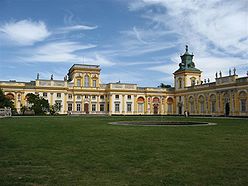 |
Warsaw Warsaw Warsaw is the capital and largest city of Poland. It is located on the Vistula River, roughly from the Baltic Sea and from the Carpathian Mountains. Its population in 2010 was estimated at 1,716,855 residents with a greater metropolitan area of 2,631,902 residents, making Warsaw the 10th most... , Poland |
1677–1729 | Augustyn Wincenty Locci, Giovanni Spazzio |
| Les Invalides Les Invalides Les Invalides , officially known as L'Hôtel national des Invalides , is a complex of buildings in the 7th arrondissement of Paris, France, containing museums and monuments, all relating to the military history of France, as well as a hospital and a retirement home for war veterans, the building's... |
Paris Paris Paris is the capital and largest city in France, situated on the river Seine, in northern France, at the heart of the Île-de-France region... , France |
1679–1708 | Jules Hardouin Mansart Jules Hardouin Mansart Jules Hardouin-Mansart was a French architect whose work is generally considered to be the apex of French Baroque architecture, representing the power and grandeur of Louis XIV... |
|
| Troja Palace | Prague Prague Prague is the capital and largest city of the Czech Republic. Situated in the north-west of the country on the Vltava river, the city is home to about 1.3 million people, while its metropolitan area is estimated to have a population of over 2.3 million... , Czech Republic |
1679–1685 | Jean Baptiste Mathey Jean Baptiste Mathey Jean Baptiste Mathey was a French architect and painter born in Dijon.Between 1675 and 1694 Mathey enjoyed a remarkable career in which his French planning and devotion to classical rationality were a conscious artistic challenge to established taste.Mathey was commissioned by the Archbishop of... , Giovanni Domenico Orsi |
|
| Stift Melk | 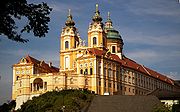 |
Melk Melk Melk is a city of Austria, in the federal state of Lower Austria, next to the Wachau valley along the Danube. Melk has a population of 5,222 .... , Austria |
1702–1736 | Jakob Prandtauer Jakob Prandtauer Jakob Prandtauer was an Austrian Baroque architect.... |
| Schloss Bensberg Schloss Bensberg Bensberg Palace is a historical building in Bensberg, part of the city of Bergisch-Gladbach, just outside Cologne, western Germany. It is a former Jagdschloss of the Counts Palatine of the Rhine. Since 1997 it accommodates a 5-Star Grand hotel of the Althoff Hotels Group.The palace was... |
Bergisch Gladbach Bergisch Gladbach ' is a city in the Cologne/Bonn Region of North Rhine-Westphalia, Germany and capital of the Rheinisch-Bergischer Kreis .-Geography:Bergisch Gladbach is located east of the river Rhine, approx... , Germany |
1703–1711 | Matteo Alberti Matteo Alberti Matteo Alberti is an Italian footballer, who is currently a free agent after he was released by Queens Park Rangers.... |
|
| Saint Nicholas Church (Malá Strana) | Prague Prague Prague is the capital and largest city of the Czech Republic. Situated in the north-west of the country on the Vltava river, the city is home to about 1.3 million people, while its metropolitan area is estimated to have a population of over 2.3 million... , Czech Republic |
1703–1752 | Christoph Dientzenhofer, Kilian Ignaz Dientzenhofer | |
| Blenheim Palace Blenheim Palace Blenheim Palace is a monumental country house situated in Woodstock, Oxfordshire, England, residence of the dukes of Marlborough. It is the only non-royal non-episcopal country house in England to hold the title of palace. The palace, one of England's largest houses, was built between... |
 |
Woodstock Woodstock, Oxfordshire Woodstock is a small town northwest of Oxford in Oxfordshire, England. It is the location of Blenheim Palace, a UNESCO World Heritage Site.Winston Churchill was born in Blenheim Palace in 1874 and is buried in the nearby village of Bladon.... , England |
1705–1722 | Sir John Vanbrugh John Vanbrugh Sir John Vanbrugh – 26 March 1726) was an English architect and dramatist, perhaps best known as the designer of Blenheim Palace and Castle Howard. He wrote two argumentative and outspoken Restoration comedies, The Relapse and The Provoked Wife , which have become enduring stage favourites... |
| Zwinger Zwinger The Zwinger is a palace in Dresden, eastern Germany, built in Baroque style. It served as the orangery, exhibition gallery and festival arena of the Dresden Court.... Palace |
Dresden Dresden Dresden is the capital city of the Free State of Saxony in Germany. It is situated in a valley on the River Elbe, near the Czech border. The Dresden conurbation is part of the Saxon Triangle metropolitan area.... , Germany |
1709–1732 | Matthäus Daniel Pöppelmann Matthäus Daniel Pöppelmann Matthäus Daniel Pöppelmann was a German master builder who helped to rebuild Dresden after the fire of 1685, and designed Dresden Castle and the Pillnitz church.Pöppelmann was born in Herford... |
|
| Pommersfelden castle | Pommersfelden Pommersfelden Pommersfelden is a community in the Upper Franconian district of Bamberg.-Constituent communities:The community of Pommersfelden is subdivided into four Gemarkungen with a total of ten settled centres, each given here with its own population figure:*Gemarkung Oberndorf:-Population... , Germany |
1711–1719 | Johann Dientzenhofer Johann Dientzenhofer Johann Dientzenhofer was a builder and architect during the Baroque period in Germany.Johann was born in St. Margarethen near Rosenheim, Bavaria, a member of the famous Dientzenhofer family of German architects, who were among the leading builders in the Bohemian and German Baroque which included... and Johann Lucas von Hildebrandt |
|
| Karlskirche Karlskirche The St. Charles's Church is a church situated on the south side of Karlsplatz, Vienna. It is located on the edge of the 1st district, 200 metres outside the Ringstraße... |
Vienna Vienna Vienna is the capital and largest city of the Republic of Austria and one of the nine states of Austria. Vienna is Austria's primary city, with a population of about 1.723 million , and is by far the largest city in Austria, as well as its cultural, economic, and political centre... , Austria |
1715–1737 | Johann Fischer von Erlach Johann Bernhard Fischer von Erlach ----Johann Bernhard Fischer von Erlach, born Johann Bernhard Fischer was probably the most influential Austrian architect of the Baroque period.... |
|
| Mafra Palace | Mafra, Portugal | 1717–1730 | João Frederico Ludovice | |
| Holy Trinity Column Holy Trinity Column in Olomouc The Holy Trinity Column in Olomouc is a Baroque monument in the Czech Republic, built in 1716–1754 in honour of God. The main purpose was a spectacular celebration of Catholic Church and faith, partly caused by feeling of gratitude for ending a plague, which struck Moravia between 1714 and... |
 |
Olomouc Olomouc Olomouc is a city in Moravia, in the east of the Czech Republic. The city is located on the Morava river and is the ecclesiastical metropolis and historical capital city of Moravia. Nowadays, it is an administrative centre of the Olomouc Region and sixth largest city in the Czech Republic... , Czech Republic |
1716–1754 | Wenzel Render |
| Pilgrimage Church of Saint John of Nepomuk Pilgrimage Church of Saint John of Nepomuk The Pilgrimage Church of St John of Nepomuk at Zelená Hora is a religious building in Žďár nad Sázavou, Czechia, near the border between Bohemia and Moravia... |
Žďár nad Sázavou Ždár nad Sázavou Žďár nad Sázavou is a city in the Vysočina Region of the Czech Republic. It has approximately 24,000 inhabitants and is the administrative capital of the Žďár nad Sázavou District. The city is a prominent centre of tourism, as a ski resort in winter and a popular destination for cycling and... , Czech Republic |
1719–1722 | Jan Santini Aichel Jan Santini Aichel Jan Blažej Santini Aichel was a Czech architect of Italian descent, whose major works represent a curious amalgam of the Gothic and Baroque styles.-Biography:... |
|
| Palace of La Granja La Granja (palace) The Royal Palace of La Granja de San Ildefonso is an 18th century palace in the small town of San Ildefonso in the hills near Segovia, 80 km north of Madrid, central Spain, formerly the summer residence of the Kings of Spain since the reign of Philip V... |
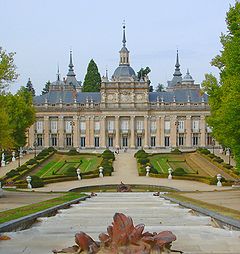 |
Segovia Segovia Segovia is a city in Spain, the capital of Segovia Province in the autonomous community of Castile and León. It is situated north of Madrid, 30 minutes by high speed train. The municipality counts some 55,500 inhabitants.-Etymology:... , Spain |
1720–1740 | Teodoro Ardemans Teodoro Ardemans Teodoro de Ardemans was a Spanish architect and painter.He was a disciple of the painter Claudio Coello, although he mainly practiced architecture; the municipality of Toledo named him master of the Cathedral of Toledo. In 1702, King Philip V of Spain named him to succeed José del Olmo as the... and Filippo Juvarra Filippo Juvarra Filippo Juvarra was an Italian architect and stage set designer.-Biography:Filippo Juvarra was an Italian Baroque architect working in the early part of the eighteenth century. He was born in Messina, Sicily, to a family of goldsmiths and engravers... |
| Würzburg Residence Würzburg Residence The Würzburg Residence is a palace in Würzburg, southern Germany. Johann Lukas von Hildebrandt and Maximilian von Welsch, representants of the Austrian/South German Baroque were involved in the construction, as well as Robert de Cotte and Germain Boffrand, who were followers of the French Style... |
Würzburg Würzburg Würzburg is a city in the region of Franconia which lies in the northern tip of Bavaria, Germany. Located at the Main River, it is the capital of the Regierungsbezirk Lower Franconia. The regional dialect is Franconian.... , Germany |
1720–1740 | Balthasar Neumann Balthasar Neumann Johann Balthasar Neumann , also known as Balthasar Neumann, was a [German] military artillery engineer and architect who developed a refined brand of Baroque architecture, fusing Austrian, Bohemian, Italian, and French elements to design some of the most impressive buildings of the period,... |
|
| Karlova Koruna Chateau | Chlumec nad Cidlinou Chlumec nad Cidlinou Chlumec nad Cidlinou is a city of the Czech Republic in Bohemia, Hradec Králové Region.It is situated near Hradec Králové at the confluence of the rivers Cidlina and Bystřice. The town lies at an average height of 206 metres above sea level... , Czech Republic |
1721–1723 | Jan Santini Aichel Jan Santini Aichel Jan Blažej Santini Aichel was a Czech architect of Italian descent, whose major works represent a curious amalgam of the Gothic and Baroque styles.-Biography:... , František Maxmilián Kaňka František Maxmilián Kanka František Maxmilián Kaňka was a Czech architect and builder.He is most famous for reconstructions of palaces and castles of Bohemian noblemen and for designs of churches and other religious buildings, principally in Baroque style... |
|
| Peterhof Palace Peterhof Palace The Peterhof Palace in Russian, so German is transliterated as "Петергoф" Petergof into Russian) for "Peter's Court") is actually a series of palaces and gardens located in Saint Petersburg, Russia, laid out on the orders of Peter the Great. These Palaces and gardens are sometimes referred as the... |
St Petersburg, Russia | 1721–1755 | Bartolomeo Rastrelli Bartolomeo Rastrelli Francesco Bartolomeo Rastrelli was an Italian architect naturalized Russian. He developed an easily recognizable style of Late Baroque, both sumptuous and majestic... |
|
| Frauenkirche Dresden Frauenkirche The Dresden Frauenkirche is a Lutheran church in Dresden, eastern Germany.Built in the 18th century, the church was destroyed in the firebombing of Dresden during World War II. It has been reconstructed as a landmark symbol of reconciliation between former warring enemies... |
Dresden Dresden Dresden is the capital city of the Free State of Saxony in Germany. It is situated in a valley on the River Elbe, near the Czech border. The Dresden conurbation is part of the Saxon Triangle metropolitan area.... , Germany |
1726–1738 | George Bähr George Bähr George Bähr was a German architect.-Life:George Bähr was born into a poor family of in Fürstenwalde , the son of a weaver. The village priest, however, helped pay for his education, and Bähr was able to become a carpenter’s apprentice in Lauenstein, Saxony.In 1690, Bähr went to Dresden to start... |
|
| Trevi Fountain Trevi Fountain The Trevi Fountain is a fountain in the Trevi rione in Rome, Italy. Standing 26 metres high and 20 metres wide, it is the largest Baroque fountain in the city and one of the most famous fountains in the world.... |
Rome Rome Rome is the capital of Italy and the country's largest and most populated city and comune, with over 2.7 million residents in . The city is located in the central-western portion of the Italian Peninsula, on the Tiber River within the Lazio region of Italy.Rome's history spans two and a half... , Italy |
1732–1762 | Nicola Salvi Nicola Salvi Nicola Salvi or Niccolò Salvi was an Italian architect most famous for the Trevi Fountain in Rome, where he was born and died. His work is in the late Roman Baroque style. In addition to the Trevi Fountain, Salvi did minor works such as churches and the enlargement of the Odescalchi Palace with... |
|
| The High Street screen of Queen's College The Queen's College, Oxford The Queen's College, founded 1341, is one of the constituent colleges of the University of Oxford in England. Queen's is centrally situated on the High Street, and is renowned for its 18th-century architecture... |
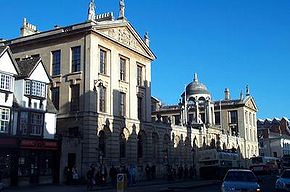 |
Oxford Oxford The city of Oxford is the county town of Oxfordshire, England. The city, made prominent by its medieval university, has a population of just under 165,000, with 153,900 living within the district boundary. It lies about 50 miles north-west of London. The rivers Cherwell and Thames run through... , England |
1733–1736 | Nicholas Hawksmoor Nicholas Hawksmoor Nicholas Hawksmoor was a British architect born in Nottinghamshire, probably in East Drayton.-Life:Hawksmoor was born in Nottinghamshire in 1661, into a yeoman farming family, almost certainly in East Drayton, Nottinghamshire. On his death he was to leave property at nearby Ragnall, Dunham and a... |
| Royal Palace of Madrid Royal Palace of Madrid The Palacio Real de Madrid is the official residence of the King of Spain in the city of Madrid, but it is only used for state ceremonies. King Juan Carlos and the Royal Family do not reside in the palace, choosing instead the more modest Palacio de la Zarzuela on the outskirts of Madrid... |
Madrid Madrid Madrid is the capital and largest city of Spain. The population of the city is roughly 3.3 million and the entire population of the Madrid metropolitan area is calculated to be 6.271 million. It is the third largest city in the European Union, after London and Berlin, and its metropolitan... , Spain |
1738–1755 | Filippo Juvarra Filippo Juvarra Filippo Juvarra was an Italian architect and stage set designer.-Biography:Filippo Juvarra was an Italian Baroque architect working in the early part of the eighteenth century. He was born in Messina, Sicily, to a family of goldsmiths and engravers... , Juan Bautista Sacchetti and Ventura Rodríguez Ventura Rodríguez Ventura Rodríguez Tizón was a Spanish architect and artist. Born at Ciempozuelos, Rodríguez was the son of a bricklayer. In 1727, he collaborated with his father in the work at the Royal Palace of Aranjuez.-Major works:... . |
|
| St. Michael's Golden-Domed Monastery St. Michael's Golden-Domed Monastery St. Michael's Golden-Domed Monastery is a functioning monastery in Kiev, the capital of Ukraine. The monastery is located on the right bank of the Dnieper River on the edge of a bluff northeast of the Saint Sophia Cathedral... |
Kiev Kiev Kiev or Kyiv is the capital and the largest city of Ukraine, located in the north central part of the country on the Dnieper River. The population as of the 2001 census was 2,611,300. However, higher numbers have been cited in the press.... , Ukraine |
ca. 1746 | Ivan Hryhorovych-Barskyi Ivan Hryhorovych-Barskyi Ivan Hryhorovych-Barskyi or Ivan Grigorovich-Barsky is a Ukrainian architect who worked in the Late Cossack Baroque style... and others |
|
| Red Gate Red Gate Red Gates in Moscow was a triumphal arch built in an exuberantly baroque design. Gates or arches of this type were common in 18th century Moscow. However, the Red Gates were the only one that survived into 20th century... |
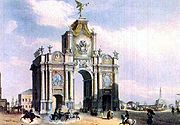 |
Moscow Moscow Moscow is the capital, the most populous city, and the most populous federal subject of Russia. The city is a major political, economic, cultural, scientific, religious, financial, educational, and transportation centre of Russia and the continent... , Russia |
1753–1757 | Dmitry Ukhtomsky Dmitry Ukhtomsky Prince Dmitry Vasilyevich Ukhtomsky, Дмитрий Васильевич Ухтомский was the chief architect of Moscow, Russia during the reign of Empress Elizabeth.-Biography:... |

